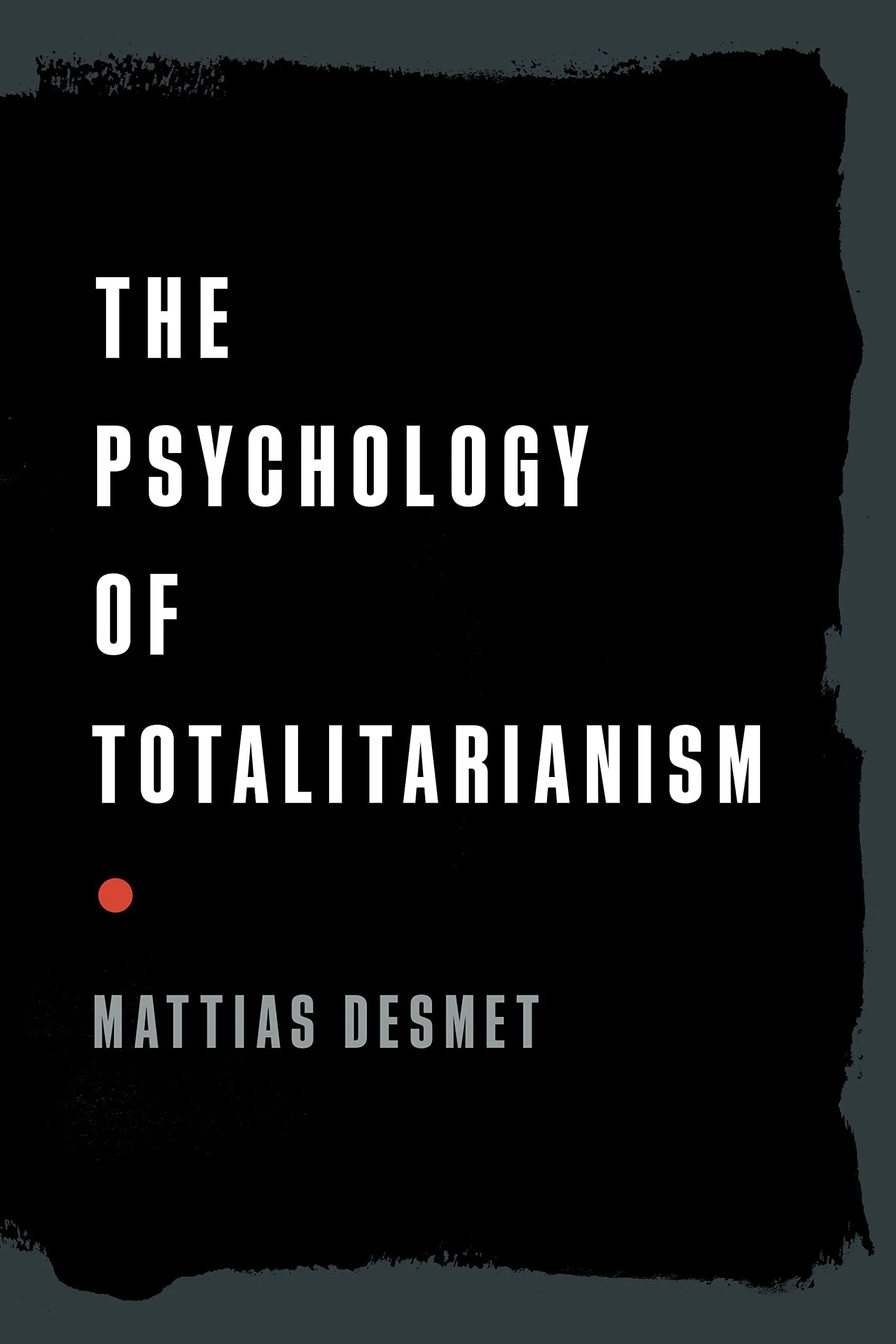Review: The Psychology of Totalitarianism
Mattias Desmet‘s book, The Psychology of Totalitarianism, is a milestone in understanding group behaviour, as well as a stern warning for our times. The Belgian clinical psychologist exposes how individuals can be transformed into a blind and unthinking collective that shuns all dissent.
It was the global reaction to the covid-19 pandemic that helped Desmet crystallise his ideas. He noticed how, in responding to preventive measures, such as lockdowns and mask wearing, people acted as if driven through a commonly shared pressing need, rather than through deliberation or reflection. His book is a clear exposition of this process and how it is leading to a new totalitarianism today – the consequence, he argues, of mechanistic thinking and the delusional belief in the omnipotence of human rationality.
Desmet started forming his ideas a few years before the pandemic, however. He had identified something he terms mass formation – “a kind of group hypnosis that destroys individuals’ ethical self-awareness and robs them of their ability to think critically”, an insidious process which unsuspecting populations fall prey to. Thus people become willing to sacrifice their own interests to keep solidarity with the masses, growing intolerant of dissident voices and highly susceptible to pseudo-scientific propaganda. He quotes historian Yuval Noah Harari in making the important point that, while most people associate ‘totalitarianism’ with labour, concentration and extermination camps, “those are merely the final, bewildering stage of a long process.”
Why has this been able to happen? Desmet’s argument is rooted in unmet basic needs, already prevalent in the West well before the pandemic, as evidenced by high levels of opioid addiction, depression, and burnout. If people are socially isolated, disconnected from nature, work too much on screens, or have unchallenging and mechanistic jobs, then basic needs for belonging, autonomy and meaning will be unmet. An all-pervasive anxiety ensues, which we desperately try to understand and dispel by any means. If a narrative is offered that might explain its cause (for instance, a life-threatening virus), we will bind to it powerfully, pivoting away from painful social isolation into total interconnectedness – or at least its illusion. This collective joining up to one cause in a highly focused and fixated way is mass formation in action. Participants do not believe in the story because it is true but because of the social bonds it automatically provides.
To many, the global collective response of lockdowns and masks were necessary measures to save lives – a virtuous goal. To others, they were signs of inexplicable mass behaviour without proven value and with potential for harm. For Desmet, they are rituals that may not have practical value except to cohere individuals into one unthinking and obedient mass. Many dangers result: lack of social contact and access to health care, dire economic consequences, and, critically, intolerance of any idea or person who contradicts the narrative. The desire to remain in the trance is so intense that victims are incapable of seeing the absurdity of their actions. Desmet points out that about 30 per cent of any population rush into mass formation and another 30 per cent reject it, while the remaining 40 per cent are unconvinced, but go with the societal flow to protect vested interests.
This kind of rapid and complete group cohesion may have once been an effective response to existential threat on the savannah, against predators or other tribes. However, evolutionary adaptations can go wrong. Today, mass formation is increasingly refracted through screens, and encouraged by a growing elite that believes humans can be manipulated and optimised through technology.
In a key chapter for today, Desmet argues that mass formation is part and parcel of the rise of a technocratic totalitarianism. Consumerism at a global scale, an increasing prevalence and use of screens and digital technology, propaganda, mass conditioning, and an Orwellian bureaucracy affecting every aspect of our lives – all driven by the algorithms of the oligarchs and sweeping decisions made by a few for the many – add up to atomised lives where basic needs cannot be met, again setting up the conditions for mass formation and totalitarian control. A technocratic prison ensues, constituted not of crude and visible gulags but of entrancement in our very homes, a silent sleep from which few dare wake. In the name of the greater good, control becomes total.
Many believe this is the result of a global conspiracy fuelled by greed and desire to control. Desmet posits that even those who lead the formation process are caught up in it – we are all victims of the same thought pattern and ideology. Politicians and the media may take advantage of citizens’ anxiety, but they do not necessarily create it for gain. Most dangerously, while the media and leaders’ voices entrance us, dissent must be silenced. As we saw during the covid-19 pandemic, we will devalue those who try to awaken us.
Inevitably, Desmet argues, mass formation collapses from its own weight – or fixations. The reckless and often unachievable goals (for instance, ‘zero covid’) ignore other crucial aspects of reality, such as economics; dissatisfaction grows, and the citizens, disappointed with their leaders’ failures, ultimately turn on them.
So, what can be done? The author suggests that all those who have not fallen into mass formation need to speak out to keep the trance from deepening. Confronting and arguing with the sleepwalkers does not work because they will vehemently attack anyone threatening the salve for their anxiety, their born-again sense of belonging. So, this must be done calmly and obliquely.
Desmet cites witch hunts, the Crusades and Nazism as historical examples of mass formation – and there are also seemingly innocuous forms, of course, such as people coming together around Queen Elizabeth’s funeral or a football match. He contextualises mass formation through failures of ideological science (as opposed to true science “which adapts its theory to reality, whereas ideology adapts reality to theory”), psychoanalytic explanations, and a broader view of human purpose. These vary in quality and utility, although they do not take away from the rich exposition of the core idea.
In the longer term, we can envisage another kind of world where social context permits innate needs to be met, and where awareness of mass formation lessens the likelihood of its unconscious grip taking hold. Such a living culture would value human connections through stories, myths, humour, and immediate experience, rather than screens, rules, regulations and control.
We are not there yet but we do have a way out, should we choose to take it: we have the ability to nurture a freer mind that works within uncertainty, and an equal measure of joy and bitterness, rather than the false promise of a technocratic paradise and an eternal childhood. Mattias Desmet’s book helps us move in that direction.
*
The Psychology of Totalitarianism, Mattias Desmet, Chelsea Green Publishing, $28.00
This article was written by John Bell, the Director and Co-Founder of The Conciliators Guild. This review first appeared in The Human Givens Journal, Vol. 29, No. 2, 2022.





